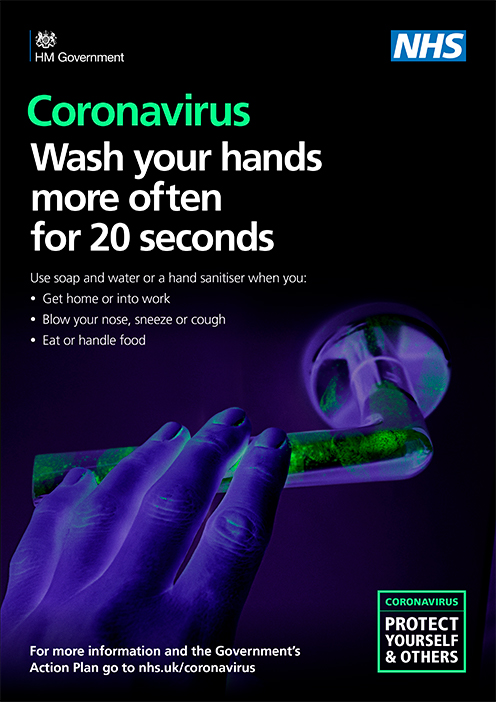COVID-19 (coronavirus) – local UPDATE Wednesday 4 March am
Shropshire Council and Telford and Wrekin Council have been working closely with Public Health England West Midlands and local NHS partners to prepare and respond to COVID-19 (coronavirus).
As yet (Wednesday 4 March 2020 am), there have been no positive local cases confirmed in either the Shropshire or Telford and Wrekin areas.

COVID-19 (coronavirus) advice
Both unitary councils in the county, the NHS and Public Health England organisations have been working together to co-ordinate appropriate action and resources to protect the public’s health, and to plan and prepare for any changes in the situation, should they arise. This includes the setting up of Shropshire Local Health Resilience Partnership to co-ordinate plans. All partners keep in regular contact and take part in daily and weekly update meetings with both local, regional and national colleagues.
Work currently being undertaken:
- Promoting national guidance and key messages to the public, staff and organisations, including schools.
- Shrewsbury and Telford Hospital NHS Trust have a priority testing service (‘pod’) in place at Princess Royal Hospital for people directed to them through NHS 111, and there will soon be one at Royal Shrewsbury Hospital.
- Shropshire Community NHS Trust is developing home and community testing.
NHS and Public Health England have provided advice and guidelines on things you can do to protect you and your family to help stop germs like COVID-19 spreading. These include:-
- Always carry tissues with you and use them to catch your cough or sneeze. Then bin the tissue, and wash your hands, or use a sanitiser gel.
- Wash your hands often with soap and water, especially after using public transport. Use a sanitiser gel if soap and water are not available.
- Avoid touching your eyes, nose and mouth with unwashed hands.
- Avoid close contact with people who are unwell.
- We should do this all day every day, as we should for flu.
Good regular cleaning with normal detergent of surfaces people touch regularly, like door handles and lift buttons, is also sensible.
Liz Noakes, Director of Public Health at Telford and Wrekin, said:
“Public Health England and the NHS are well prepared to deal with COVID-19 and we will do all we can to support them as a priority. Our focus has been on reiterating national guidance with our residents, staff and schools. The latest advice from Public Health England is that the best way to avoid catching the virus is with good hygiene. Sneeze or cough into a tissue, bin it, wash your hands frequently and don’t touch your face unless you’ve just washed your hands.
“Visit nhs.uk/coronavirus to learn more about the virus and how to protect yourself. If you think you may have COVID-19 you should call NHS 111, or use the NHS online COVID-19 service which can tell you what to do next. Do not go to your GP, pharmacy or hospital.”
The risk to the UK public is considered to be moderate, as the infection and death rates for the virus appear to be broadly similar to seasonal flu currently.
From what we know about other coronaviruses, spread of COVID-19 is most likely to happen when there is close contact (within 2 metres) with an infected person. It is likely that the risk increases the longer someone has close contact with an infected person.
The following symptoms may develop in the 14 days after exposure to someone who has COVID-19 infection; cough, difficulty in breathing, fever. Generally, these infections can cause more severe symptoms in people with weakened immune systems, older people, and those with long-term conditions like diabetes, cancer and chronic lung disease.
Rachel Robinson, Shropshire Council’s director of public health, added:-
“The situation around COVID-19 is changing regularly and I would encourage people to visit the Public Health England website if you want to find out the latest information gov.uk/coronavirus.
“Anyone who has travelled from China or places specified on the Public Health England site* in the last 14 days and develop symptoms, however mild, you should return home, stay indoors at home and avoid contact with other people immediately and call NHS 111. You do not need to follow this advice if you have no symptoms.”
Further information
* The LHRP includes representatives from: Shropshire Council, Telford & Wrekin Council, NHS England and Improvement Emergency Preparedness, Resilience and Response (EPRR) leads, Shrewsbury and Telford Hospital NHS Trust, Shropshire Community Health Trust, Robert Jones and Agnes Hunt Foundation Trust, Shropshire Clinical Commissioning Group, Telford and Wrekin Clinical Commissioning Group, Public Health England.
*Locations specified by Public Health England
- Northern Italy
- Vietnam
- Cambodia
- Laos
- Myanmar
- Other parts of China outside Hubei province
- Thailand
- Japan
- Republic of Korea
- Hong Kong
- Taiwan
- Singapore
- Malaysia
- Macau

